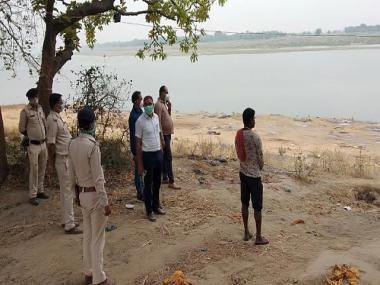“Two to four bodies can be seen floating past the River Ganga’s ‘Chausa Ghat’ every 10 to 15 days,” said Buxar-based social worker Manoj Kumar, “In fact, some rural communities believe that if people do not marry, they will not be cremated and that their bodies will float along the Ganga. But the number of bodies at Chausa Ghat is higher than normal. I believe that most of the bodies at Ghazipur are at least five to six days old.”
The River Ganga flows through the coastal area of Ghazipur in Uttar Pradesh, the aforementioned ‘Chausa Ghat’ and other rural areas of Buxar. So whatever flows through Varanasi reaches the banks of the Ganga in Ghazipur. And downstream, whatever flows from the ghats of the Ganga in Ghazipur reaches Chausa Ghat.
On the condition of anonymity, a local said that people cremated bodies at two places in Chausa block: At the crematorium in Chausa town and at Chausa Ghat. But the villagers of surrounding rural areas in a 35-kilometre radius prefer to carry their dead to the Ganga. There are two main reasons for this: Religious faith and poverty. As with the rest of the country during these times, the toll has also increased in the Chausa block of Buxar.
“On normal days, two or three bodies used to arrive at Chausa’s crematorium daily. But the number has ballooned to almost 60 during this current period; now that the number of dead in the town has increased, the number in the rural areas is bound to increase too. And so many more bodies are arriving at Chausa Ghat,” he added. Citing a lack of COVID-awareness, he said that people rarely get a checkup when they are unwell and so, succumb to a shortness of breath after 15 days or so. “Yesterday, villagers brought a body from Rajpur block (15 kilometres away) to Chausa Ghat. They wanted to push it into the Ganga, but the sub-divisional magistrate (SDM) was present at the scene. He stopped the villagers and paid for the cremation and ensured it was carried out in front of him.”
He added, “At present, the level of water in the Ganga is low, and so bodies are placed on the banks of the rivers. Sometimes, wild animals desecrate the bodies. Yesterday, the district administrator removed around 71 bodies from the vicinity of Chausa Ghat. DNA samples were taken and the bodies were buried.”
Corroborating this account, KK Upadhyay, SDM for Buxar, said, “Look, these 71 bodies were not found together at one place. These bodies were found some distance apart on the banks of the Ganga. These bodies are also five to six days old. These bodies have come from villages like Gahmar in Ghazipur, where it is a tradition to carry the bodies into the Ganga. The bodies were so decomposed that after sampling their DNA, we buried them at the ghat itself. Yesterday, some villagers brought a body for funeral, which we cremated.”
The former head of the Gahmar village said that 25 bodies that were carried by the Ganga from Varanasi to Ganga Ghat in the village, and were found on the banks. “Yesterday, government officials of our area also came and strictly told our villagers not to push bodies into the river. After experiencing a fever, cough and cold, people in our village succumbed to breathing problems,” he said, adding, “The number of such deaths is around 12 per day.”
Of this, nearly a third flow into the Ganga and have drifted along towards Buxar. The prohibitively expensive cost of carrying out a cremation drives locals to push their dead into the river. The former village head added, “It is not just our village. This is seen in almost all the villages situated along the banks of the Ganges. People of villages like Birpur, Zamania, Bara etc push their dead into the river.”
Birpur’s JP Rai said, “Some of the corpses in Chausa belong to locals, but they also just float away from our area. Just yesterday, we pushed the body of one of our relatives into the Ganga. For the past 15 days this has been a common occurrence in Birpur village. The shortage of wood is one of the reasons we push bodies into the Ganga. Since it’s the summer and the speed of the Ganga isn’t very high, bodies flow towards the shore instead of washing down river.”
Health



